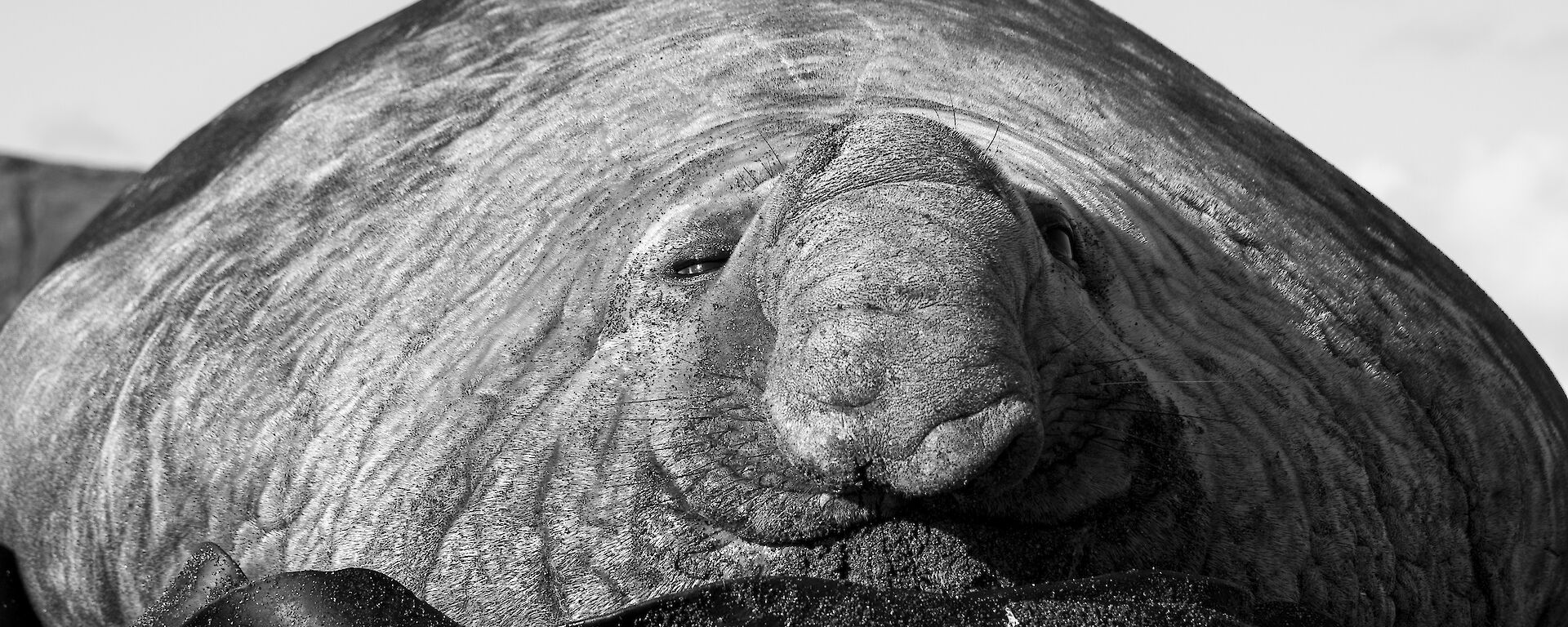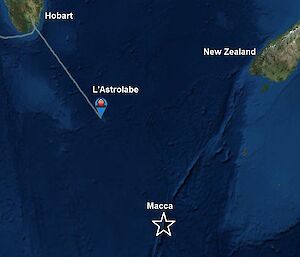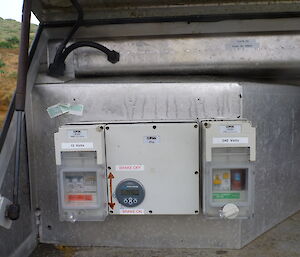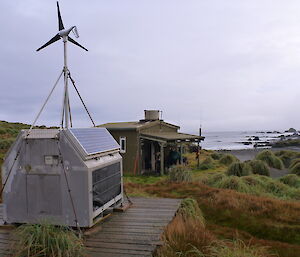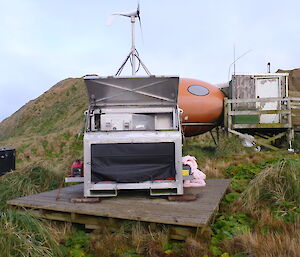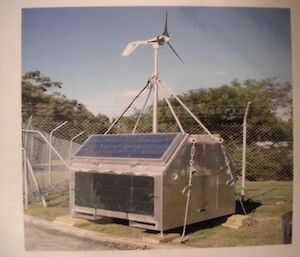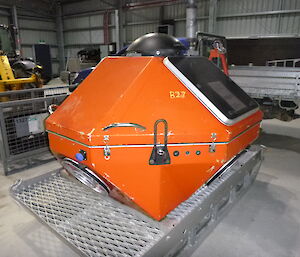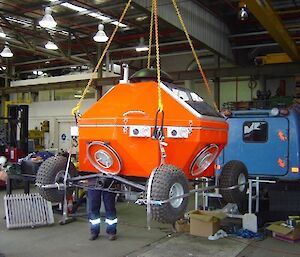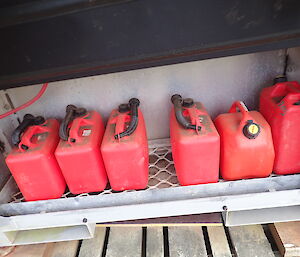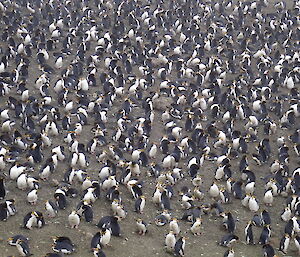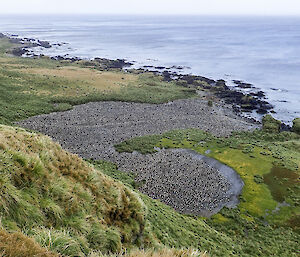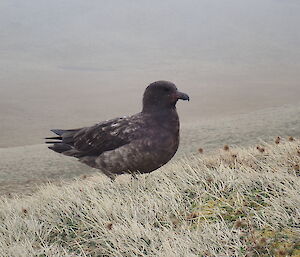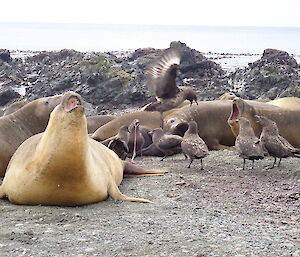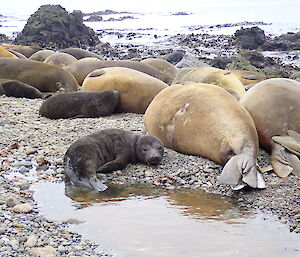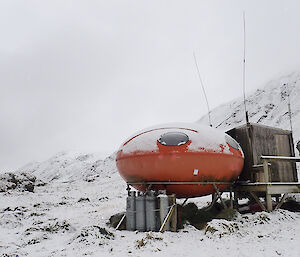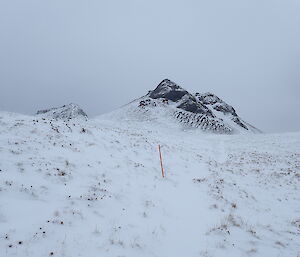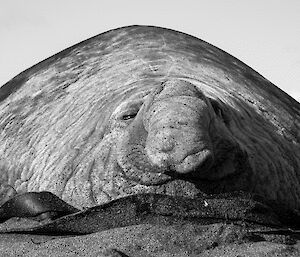The French resupply icebreaker L’Astrolabe, en route to the French station Dumont d’Urville in Adélie Land, Antarctica, will stop here at Macca to deliver essential personnel and cargo this week. In anticipation the station is busy preparing for the ships arrival — expected Thursday.
This week at Macquarie Island: 9 November 2018
The RAPS (Remote Area Power Supply) of Macquarie Island
At Macquarie Island we have five field huts and one refuge located at strategic locations around the island, on the east and the west coasts. Each field hut has a RAPS unit that supplies the electrical power, contains a portable generator, and houses the fuel/spares/tools and also the spare emergency field stove.
As the station electrician, it is part of my responsibility to inspect, test and service these RAPS units as required. To allow me to carry out this work I wanted to know a lot more about their operation and also the history of the units. In particular, I’m interested in who designed them and how they came to be used, because they're a very important part of our life in the field.
After some research I found that Dugald McLaren was behind the design and construction of our units. So I contacted him and he kindly provided a brief history and some photos for this article:
“I summered at Macca 99/00, and while out in the field I noticed there were many significant hazards and problems [with power supplies] that had accumulated over the years in the field huts. For example, the cold porches had become storage areas for batteries, various fuels, hunters’ ammunition, rodent baits, etc. Petrol generators were also being operated in these areas, and being refuelled from jerry cans resulting in spills. Some of the wiring in the huts was also dangerous; a result of DIY and short-term fixes. In short, multiple fire hazards, potential carbon monoxide poisoning, environmental damage from fuel spills, unreliable power supply and difficult maintenance.
I mentioned these issues in my final report, proposing a solution of self-contained fly-in units isolated from the huts. They would be consistent between all huts, simple to operate for non-technical people, avoided fuel spillage, included appropriate electrical protections and incorporated solar, wind and petrol generators. The idea was also to have a spare unit at the station to allow new electricians/field personnel to get familiar with it before going out, and also be a spare parts donor when needed.
I designed and was contracted to build a prototype (which I last saw at Kingston) and on the basis of that given the go-ahead to build five additional RAPS for the island. The basic bodies were built by aluminium fabricators to my drawings and I completed them at Kingston (mast assemblies, door systems, gen/batt drawers, electrics, fuel transfer pumps, lift points, adjustable legs, etc.).
It’s nice to know the RAPS have been operating reliably for 17 years now and have passed the test of time.
After completing the Macca RAPS, I designed/built a few other systems for AAD including a one off RAPS for Heard Island out of fibreglass, which was amphibious, self-righting, carried 400L fuel, 6kva gen, batteries and associated12/240V equipment. After Heard Island, its wheels were replaced with a sled and it went to the continent. I also designed and built a flat packing unit intended for a small field camp that could fit in a Hägglunds/ute/helicopter or a sled version that could be towed by a quad or a person.
Cheers, Dugald
Footnotes:
The prototype RAPS Unit was sent down to Macquarie Island in the summer of 2017 and it has been adapted to provide electrical power to the lighting system that provides shipping guidance during our re-supplies. So now all six of the units that Dugald built are here on the island.
The fibreglass RAPS unit built for Heard Island is now at Davis. A recent photo — thanks Trevor Crews.
I am unsure where the flat-packing unit is now located.
Peter Lecompte
Macca Station Electrician 2018
Last Trip Down The Island
It’s with a tear of sadness that I sit down to write my last update from Macquarie Island (for 2018). It’s a hard thing to leave these beautiful people that have become my family over the last year, but I am very happy to be coming home to see my family, my friends and my lovely lady who’s been manning the home front in my absence.
As I type this, the French icebreaker L’Astrolabe is on her way here with new summer expeditioners — new Tas Parks Rangers, a new Field Training Officer, a new Storeman, and a group of people working on the planning stages of building the new station.
As you read this, we will have unloaded those personnel and a limited amount of essential cargo (hopefully there’s fresh apples and some haloumi in there), and L’Astrolabe will be sailing further south to resupply the French station Dumont d’Urville.
But as none of these things have happened yet, it’s hard to capture them in photos — instead I offer you some pictures taken on my last foray into the field.
I was lucky enough to see the Royal Penguins who have returned to the island in huge numbers. They are so entertaining, especially when watching the odd one try to walk through the colony and have 100 other birds trying to peck it as they protect their own patch.
The skua are back and are probably the most hated bird on the island (by some), as they pick off penguin eggs and chicks, as well as cleaning up after the seals during the pupping season. They may be a vicious hunter, but I reckon they are graceful and full of their own character.
Most of the seal pups are now growing into ‘weaner’ status, but this photo was taken back when they were still small and cute.
A last trip into the field on Macca wouldn’t be the same without a good dumping of snow. Here is the Waterfall Bay Hut and nearby escarpment under a lovely white blanket — luckily for me that night the clouds cleared and the aurora danced across the skies… unfortunately for you, I didn’t get any decent photos that night!
Lastly, and most importantly, in the immortal words of Douglas Adams:
“So long, and thanks for all the fish”.
Richard Youd
Senior Field Training Officer/Station Supply Officer

